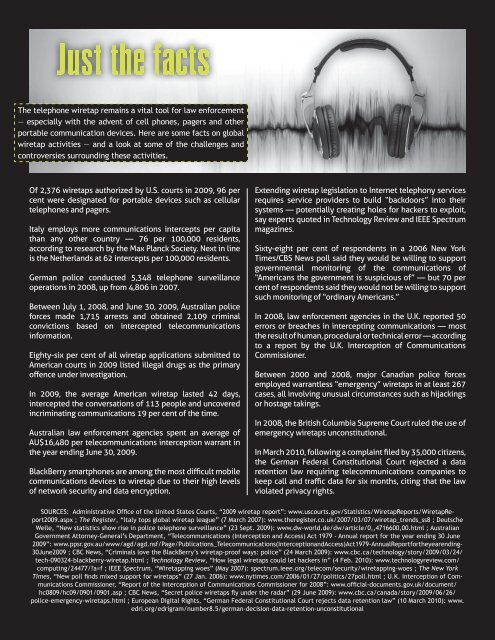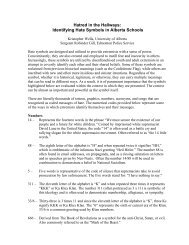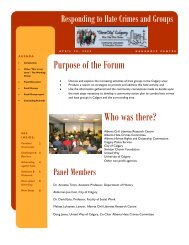RCMP Gazette Human Rights and Policing - Alberta Hate Crimes ...
RCMP Gazette Human Rights and Policing - Alberta Hate Crimes ...
RCMP Gazette Human Rights and Policing - Alberta Hate Crimes ...
You also want an ePaper? Increase the reach of your titles
YUMPU automatically turns print PDFs into web optimized ePapers that Google loves.
Just the factsThe telephone wiretap remains a vital tool for law enforcement— especially with the advent of cell phones, pagers <strong>and</strong> otherportable communication devices. Here are some facts on globalwiretap activities — <strong>and</strong> a look at some of the challenges <strong>and</strong>controversies surrounding these activities.Of 2,376 wiretaps authorized by U.S. courts in 2009, 96 percent were designated for portable devices such as cellulartelephones <strong>and</strong> pagers.Italy employs more communications intercepts per capitathan any other country — 76 per 100,000 residents,according to research by the Max Planck Society. Next in lineis the Netherl<strong>and</strong>s at 62 intercepts per 100,000 residents.German police conducted 5,348 telephone surveillanceoperations in 2008, up from 4,806 in 2007.Between July 1, 2008, <strong>and</strong> June 30, 2009, Australian policeforces made 1,715 arrests <strong>and</strong> obtained 2,109 criminalconvictions based on intercepted telecommunicationsinformation.Eighty-six per cent of all wiretap applications submitted toAmerican courts in 2009 listed illegal drugs as the primaryoffence under investigation.In 2009, the average American wiretap lasted 42 days,intercepted the conversations of 113 people <strong>and</strong> uncoveredincriminating communications 19 per cent of the time.Australian law enforcement agencies spent an average ofAU$16,480 per telecommunications interception warrant inthe year ending June 30, 2009.BlackBerry smartphones are among the most difficult mobilecommunications devices to wiretap due to their high levelsof network security <strong>and</strong> data encryption.Extending wiretap legislation to Internet telephony servicesrequires service providers to build “backdoors” into theirsystems — potentially creating holes for hackers to exploit,say experts quoted in Technology Review <strong>and</strong> IEEE Spectrummagazines.Sixty-eight per cent of respondents in a 2006 New YorkTimes/CBS News poll said they would be willing to supportgovernmental monitoring of the communications of“Americans the government is suspicious of” — but 70 percent of respondents said they would not be willing to supportsuch monitoring of “ordinary Americans.”In 2008, law enforcement agencies in the U.K. reported 50errors or breaches in intercepting communications — mostthe result of human, procedural or technical error — accordingto a report by the U.K. Interception of CommunicationsCommissioner.Between 2000 <strong>and</strong> 2008, major Canadian police forcesemployed warrantless “emergency” wiretaps in at least 267cases, all involving unusual circumstances such as hijackingsor hostage takings.In 2008, the British Columbia Supreme Court ruled the use ofemergency wiretaps unconstitutional.In March 2010, following a complaint filed by 35,000 citizens,the German Federal Constitutional Court rejected a dataretention law requiring telecommunications companies tokeep call <strong>and</strong> traffic data for six months, citing that the lawviolated privacy rights.SOURCES: Administrative Office of the United States Courts, “2009 wiretap report”: www.uscourts.gov/Statistics/WiretapReports/WiretapReport2009.aspx; The Register, “Italy tops global wiretap league” (7 March 2007): www.theregister.co.uk/2007/03/07/wiretap_trends_ss8 ; DeutscheWelle, “New statistics show rise in police telephone surveillance” (23 Sept. 2009): www.dw-world.de/dw/article/0,,4716600,00.html ; AustralianGovernment Attorney-General’s Department, “Telecommunications (Interception <strong>and</strong> Access) Act 1979 - Annual report for the year ending 30 June2009”: www.ppsr.gov.au/www/agd/agd.nsf/Page/Publications_Telecommunications(Interception<strong>and</strong>Access)Act1979-AnnualReportfortheyearending-30June2009 ; CBC News, “Criminals love the BlackBerry’s wiretap-proof ways: police” (24 March 2009): www.cbc.ca/technology/story/2009/03/24/tech-090324-blackberry-wiretap.html ; Technology Review, “How legal wiretaps could let hackers in” (4 Feb. 2010): www.technologyreview.com/computing/24477/?a=f ; IEEE Spectrum, “Wiretapping woes” (May 2007): spectrum.ieee.org/telecom/security/wiretapping-woes ; The New YorkTimes, “New poll finds mixed support for wiretaps” (27 Jan. 2006): www.nytimes.com/2006/01/27/politics/27poll.html ; U.K. Interception of CommunicationsCommissioner, “Report of the Interception of Communications Commissioner for 2008”: www.official-documents.gov.uk/document/hc0809/hc09/0901/0901.asp ; CBC News, “Secret police wiretaps fly under the radar” (29 June 2009): www.cbc.ca/canada/story/2009/06/26/police-emergency-wiretaps.html ; European Digital <strong>Rights</strong>, “German Federal Constitutional Court rejects data retention law” (10 March 2010): www.26edri.org/edrigram/number8.5/german-decision-data-retention-unconstitutional<strong>Gazette</strong>Vol. 72, No. 3, 2010







